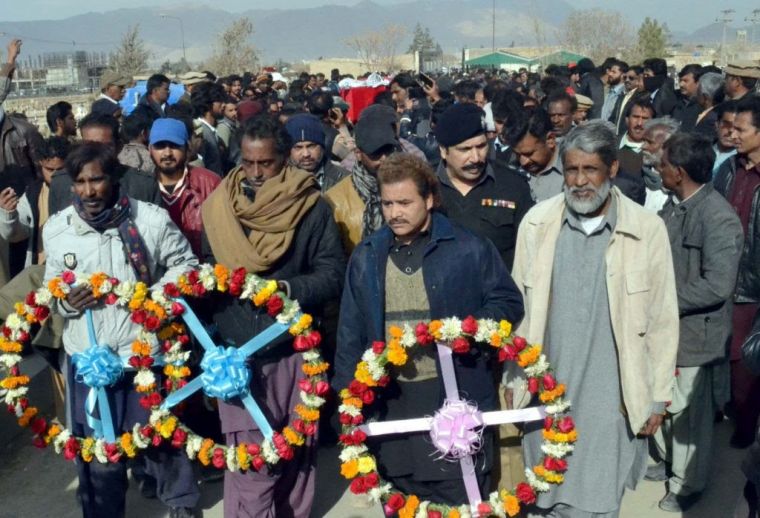Queuing for Communion, and then blown up: Pakistan's Christians bury victims of suicide attack
Christian mourners yesterday buried the eleven victims of the joint suicide attack on a church in Quetta, western Pakistan on Sunday morning, World Watch Monitor (WWM) reported.
Worshippers had been lining up to receive Communion when at least two men, armed and wearing suicide vests, attacked Bethel Memorial Methodist Church.

The attack left at least eleven dead and more than 50 injured, many in a critical condition, according to the latest unofficial accounts and WWM.
'It was a pleasant morning. We had sung songs and children had presented a Christmas programme. Pastor Simon Bashir had finished his sermon and we were moving towards the altar when we started hearing gunfire outside the church,' said Sohail Yousuf, whose 13 year-old daughter Mehak lost her life. Her 16 year-old sister Wasiqa is critically ill after an operation in Quetta's Combined Military Hospital (CMH).
Yousuf, a manager in an insurance company, moved to Quetta 16 years ago from Punjab after his wife, a government schoolteacher, was posted there.
'We bolted all the doors and were praying that God would protect each of us,' he said. 'Then a suicide bomber blew himself up at the main door. The explosion shattered the door and injured many inside. When some rushed outside, they were injured by gunfire as the terrorists were on the church lawn. But soon the situation was brought under control by the volunteer church security guards and police present there.'
The Caritas executive director Sheezan William told WWM that the first person killed was the church security guard George Masih, who tried to stop the men advancing towards the church.
Around two hundred congregants were inside the church, which was decorated for Christmas, when the terrorists unleashed their attack. Islamic State (ISIS) has claimed responsibility but provided no evidence for this claim, WWM said.
Retired brigadier Samson Simon Sharaf, a political analyst who is close to security agencies, told WWM that the attackers were four in number. 'They were equipped with ample ammunition supply and were aiming to take worshippers hostage and kill them one by one, prolonging the scene of terror as much as they could,' he said.
'One terrorist was shot in the compound before he could blow himself up inside the church. Meanwhile, the other one rushed to the church entrance where he blew himself up. The agencies chased the other two who fled, and a search operation is ongoing.
'The incident has taken place close to the sad day in the country's history, December 16 [when Pakistani forces were defeated in 1971, leading to East Pakistan becoming Bangladesh]. Our enemy keeps reminding us of our history. This time Christians are targeted who stand united with other Pakistanis against the menace of terrorism.'
The Quetta Methodist church, established in 1959, came under the control of the Church of Pakistan in 1971 after six Protestant denominations, including the Methodist Church, united as one denomination, WWM explained.
Eleven days ago, a seven-year-old boy and two others were killed during a hand grenade attack on the gates of a Christian colony in Chaman, also in Balochistan, south-western Pakistan.
Punjabi Christians staged a protest over what they say is a lack of protection from the government against Islamist attacks, outside the Lahore Press Club a few hours after the Quetta attack.
Last week, the EU Envoy on Freedom of Religion or Belief, Jan Figel, was in Pakistan, and took part in the establishment of an inter-faith advisory commission, the main aim of which is to help stop misuse of the blasphemy law.
On March 15, 2015, just before Easter, two churches in a Christian neighbourhood in Lahore came under twin suicide attacks, in which around 25 people died.
In 2016 in Lahore, Punjab, a suicide attack took place in a park, killing mostly Christians as they celebrated Easter.











